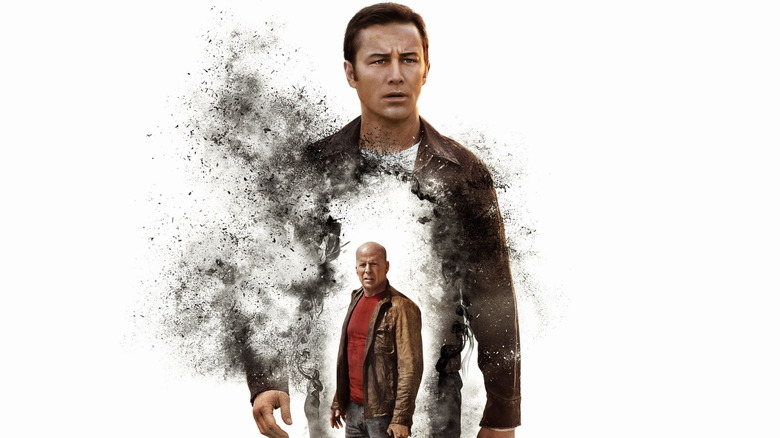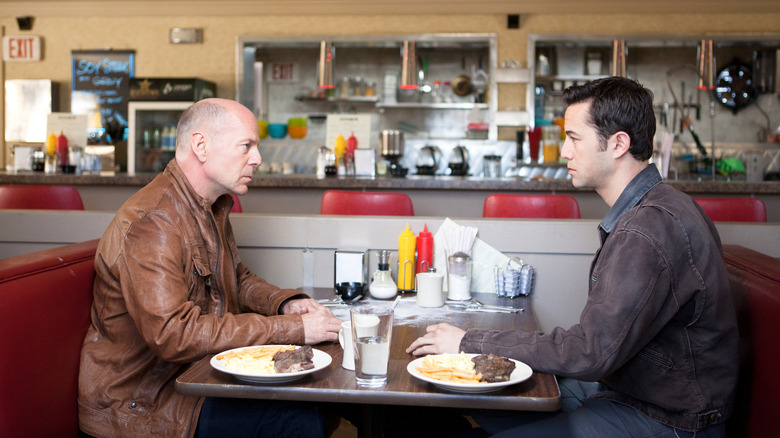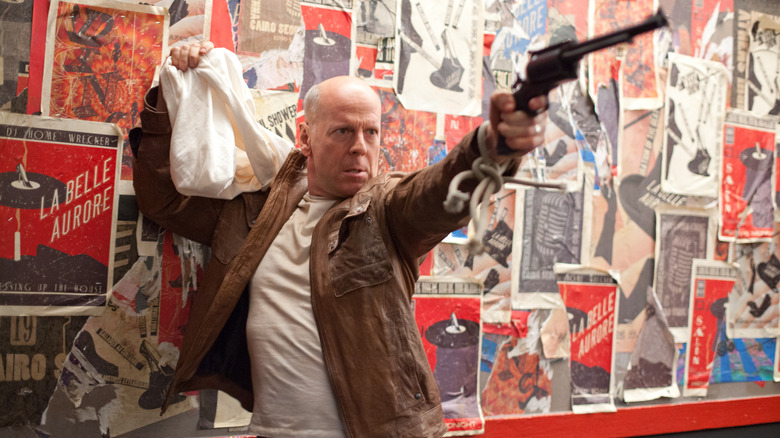Tales From The Box Office: Rian Johnson's Looper Is A Rare One-And-Done Success Story
Time travel movies are amongst the most well-trodden in the sci-fi genre. Why is that, exactly? What makes them so appealing? It's tough to pin down but they can be just about anything, from the all-timer, family-friendly blockbuster "Back to the Future" to James Cameron's R-rated "The Terminator," and even the wildly creative low-budget "Primer." One of the best additions to the genre from recent memory came in 2012 courtesy of filmmaker Rian Johnson in the form of "Looper," which sees Joseph Gordon-Levitt and Bruce Willis playing younger and older versions of the same contract killer.
The hook is that crime syndicates use illegal time travel in the future to kill people, with Loopers being the ones to do the deed. But they have an expiration date and will be killed several decades after retirement, and that retirement comes the day they kill the future version of themselves. A tantalizing and unique premise executed rather brilliantly, "Looper" was a big success — big enough to earn Johnson the job writing and directing "Star Wars: The Last Jedi." But what's perhaps most remarkable is that it managed to be a singular, one-and-done story that the film industry did not exploit for a franchise. And that is a relatively rare thing, because success often equals sequel.
In honor of the 10th anniversary of "Looper" this week, we're going to look at how it became a bright spot in several big careers, how it became a really big hit for Sony, and what lessons we can extract from it a decade later. Let's dig in, shall we?
The movie: Looper
Sometimes it's fun to talk about how a movie got made because there is a tantalizing story behind its production. A total mess behind the scenes, lots of drama, a harrowing journey. Really, "Looper" is a pretty standard success story in some ways, in acknowledging that getting any good movie made — especially an original, mid-budget sci-fi movie, is a minor miracle. Johnson had conceived of the idea as a short film years before it would ever actually get made, and for a long time it sat in a drawer collecting dust. But after his first movie "Brick" finally came out after years of struggling to get that into the world, and his follow-up "The Brothers Bloom," Johnson was given an opportunity to revisit the concept, but as a feature.
Sony's TriStar Pictures gave Johnson the green light, providing a very reasonable $30 million budget to make it happen. It was the mid-budget movie that is so often missing from today's theatrical landscape, with those movies all too often going to streaming or not being made at all. The cast shaped up nicely, with Gordon-Levitt taking on the lead role, with Willis as his counterpart from the future. An outstanding ensemble consisting of Emily Blunt, Paul Dano, Noah Segan, and Jeff Daniels would also help get the very most out of Johnson's compelling and entertaining tale.
One of the most notable things about "Looper" is that this was right at the end of Willis' era of being the movie star we all remember, with "Moonrise Kingdom" and "The Expendables 2" coming out that same year. In the years that followed Willis mostly stuck to direct-to-video fare with only the occasional theatrical appearance, and this year he retired from acting altogether due to ongoing health problems. But in "Looper," Willis had at least one last great gift to give us with his performance as Old Joe.
The financial journey
We got that gift of vintage Bruce Willis on September 28, 2012, when "Looper" opened in theaters domestically. The movie actually did not take the top spot on its opening weekend, losing handily to the family-friendly "Hotel Transylvania," which opened to $42 million. Rather, Johnson's third feature would settle for second place with $20.8 million. But the beauty of a reasonable budget is that this movie didn't need to earn a ridiculous amount to be a success in its first frame.
"Looper" held decently well, taking in another $12.1 million the following week, before suffering some more standard drops in the weeks that followed. All told, it earned $66.4 million domestically. But the real saving grace was the movie's ability to travel, as it earned a very impressive $110 million internationally, representing 62.3% of its overall $176.5 million grand total. Regardless of how one gets to that number, against a $30 million budget, that is one heck of a finish.
Sony also benefited from healthy home video sales; the film has, to date, sold more than $33 million worth of DVDs and Blu-rays domestically alone. When we account for international physical media, streaming rights, and cable, this was a flat-out home run.
The lessons contained within
The sore thumb of a lesson here is that mid-budget movies absolutely should still be something that studios aim for. In an age when budgets are spiraling further out of control for blockbusters, with $200 million or thereabouts not being at all uncommon anymore for a franchise film, betting on movies in the $20 to even $65 million range doesn't seem like a bad idea. Johnson's entire career has been a model for them, with "Knives Out" also ranking as a gigantic success story in that arena — so much so that he was able to secure a $500 million deal from Netflix for two sequels.
But the biggest of the big lessons here comes in exercising restraint when success does come about. "Looper" made a lot of money and no creative studio accounting could likely hide that much profit. Yet, credit where credit is due, both Johnson and the brass at Sony have resisted the urge to do a follow-up of any kind. This movie exists as a perfectly satisfying, singular, self-contained story. You might even say that it closed the loop.
Are there questions left dangling? Sure. Is there a larger universe to explore? Maybe! But doing a sequel or spin-off just because the financials say so isn't always the right move. In today's version of Hollywood where movies like "Law Abiding Citizen" are getting sequels for some reason, "Looper" stands out.



